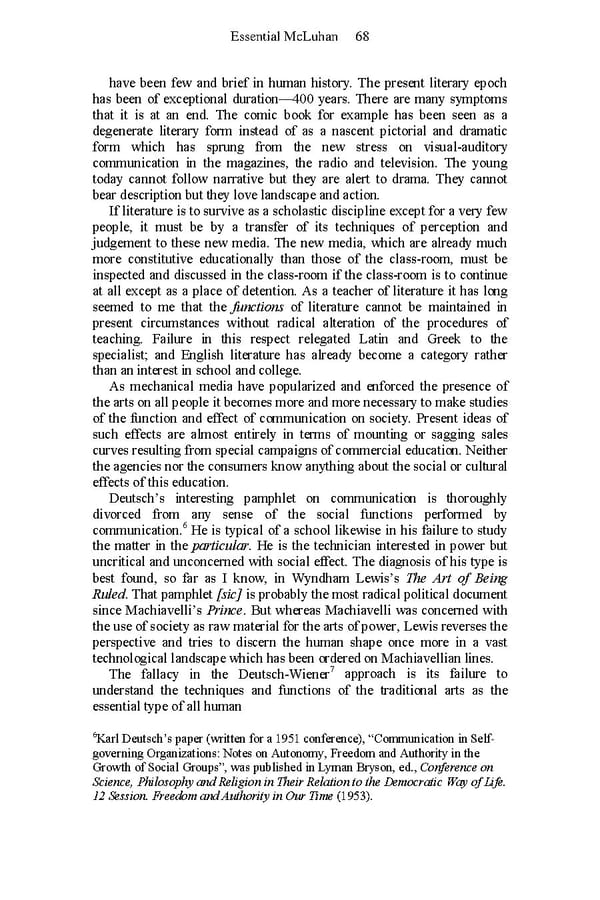Essential McLuhan 68 have been few and brief in human history. The present literary epoch has been of exceptional duration—400 years. There are many symptoms that it is at an end. The comic book for example has been seen as a degenerate literary form instead of as a nascent pictorial and dramatic form which has sprung from the new stress on visual-auditory communication in the magazines, the radio and television. The young today cannot follow narrative but they are alert to drama. They cannot bear description but they love landscape and action. If literature is to survive as a scholastic discipline except for a very few people, it must be by a transfer of its techniques of perception and judgement to these new media. The new media, which are already much more constitutive educationally than those of the class-room, must be inspected and discussed in the class-room if the class-room is to continue at all except as a place of detention. As a teacher of literature it has long seemed to me that the functions of literature cannot be maintained in present circumstances without radical alteration of the procedures of teaching. Failure in this respect relegated Latin and Greek to the specialist; and English literature has already become a category rather than an interest in school and college. As mechanical media have popularized and enforced the presence of the arts on all people it becomes more and more necessary to make studies of the function and effect of communication on society. Present ideas of such effects are almost entirely in terms of mounting or sagging sales curves resulting from special campaigns of commercial education. Neither the agencies nor the consumers know anything about the social or cultural effects of this education. Deutsch’s interesting pamphlet on communication is thoroughly divorced from any sense of the social functions performed by communication.6 He is typical of a school likewise in his failure to study the matter in the particular. He is the technician interested in power but uncritical and unconcerned with social effect. The diagnosis of his type is best found, so far as I know, in Wyndham Lewis’s The Art of Being Ruled. That pamphlet [sic] is probably the most radical political document since Machiavelli’s Prince. But whereas Machiavelli was concerned with the use of society as raw material for the arts of power, Lewis reverses the perspective and tries to discern the human shape once more in a vast technological landscape which has been ordered on Machiavellian lines. The fallacy in the Deutsch-Wiener7 approach is its failure to understand the techniques and functions of the traditional arts as the essential type of all human 6 Karl Deutsch’s paper (written for a 1951 conference), “Communication in Self- governing Organizations: Notes on Autonomy, Freedom and Authority in the Growth of Social Groups”, was published in Lyman Bryson, ed., Conference on Science, Philosophy and Religion in Their Relation to the Democratic Way of Life. 12 Session. Freedom and Authority in Our Time (1953).
 Essential McLuhan Page 74 Page 76
Essential McLuhan Page 74 Page 76